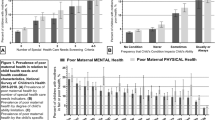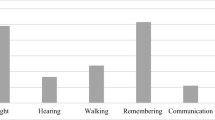Abstract
Purpose
Functional impairment is a key indicator of need for mental health services among children and adolescents, often a stronger predictor of service usage than mental health symptoms themselves. Functional impairment may be of particular importance in low- and middle-income countries (LMIC) because of its potential to focus policy on treatment of child mental health problems which is generally given low priority in LMIC. However, few studies have assessed functional impairment in LMIC. The present study assessed rates of functional impairment among children in Vietnam, as a case example of an LMIC, as well as effects of other risk/protective factors of particular relevance to LMIC (e.g., whether the family lived in an urban or rural area; family structure variables such as grandparents living with the family).
Methods
1314 parents of children 6–16 years old from 10 Vietnamese provinces were interviewed.
Results
The overall rate of functional impairment among Vietnamese children was 20 %, similar to rates in high-income countries such as Germany and the United States, suggesting that LMIC status may not be associated with dramatic increases in functional impairment in children. Functional impairment was significantly greater among mental health cases than non-cases, with increases of over 550 % associated with mental health caseness. A number of other risk factors (e.g., marital status) had smaller but significant effects.
Conclusions
Mental health problems are a major but not the sole contributor to functional impairment among Vietnamese children. The pragmatic significance of this research lies in its potential to affect public awareness and policy related to child mental health in LMIC.
Similar content being viewed by others
References
Contractor LFM, Salary C (2008) Cross-cultural psychiatry. In: Horner MS, Brent DA, Lewis DA, Reynolds CF (eds) Kupfer DJ. Oxford American handbook of psychiatry Oxford University Press, NYC, pp 1031–1044
Kirmayer LJ (2006) Beyond the ‘new cross-cultural psychiatry’: cultural biology, discursive psychology and the ironies of globalization. Transcult Psychiatry 43(1):126–144. doi:10.1177/1363461506061761
Sonuga-Barke EJS (2014) Editorial: building global science capacity in child psychology and psychiatry-Between the etic and emic of cross-cultural enquiry. J Child Psychol Psychiatry 55(4):301–303. doi:10.1111/jcpp.12234
Kieling C, Rohde LA (2012) Going global: epidemiology of child and adolescent psychopathology. J Am Acad Child Adolesc Psychiatry 51:1236–1237. doi:10.1016/j.jaac.2012.09.011
Rescorla L, Ivanova MY, Achenbach TM, Begovac I, Chahed M, Drugli MB, Zhang EY (2012) International epidemiology of child and adolescent psychopathology: integration and applications of dimensional findings from 44 societies. J Am Acad Child Adolesc Psychiatry 51:1273–1283. doi:10.1016/j.jaac.2012.09.012
Rapee RM, Bogels SM, Van der Sluis CM, Michelle GC, Ollendick T (2012) Annual Research Review: conceptualising functional impairment in children and adolescents. J Child Psychol Psychiatry 53(5):454–468. doi:10.1111/j.1469-7610.2011.02479.x
Barbro B, Gunilla T, Ulrika N (2006) ADHD and language impairment: a study of the parent questionnaire FTF (Five to Fifteen). Eur Child Adolesc Psychiatry 15:52–60. doi:10.1007/s00787-006-0508-9
Scott J, Scott EM, Hermens DF, Naismith SL, Guastella AJ, White D, Whitwell B (2014) Functional Impairment in adolescents and young adults with emerging mood disorders. Br J Psychiatry 205:362–368. doi:10.1192/bjp.bp.113.134262
Rapaport MK, Cathryn C, Rana F, Jean E (2005) Quality-of-life impairment in depressive and anxiety disorders. Am J Psychiatry 162(6):1171–1178
Ezpeleta L, Granero F, De la Osa N, Guillamon N (2000) Predictors of functional Impairment in children and adolescents. J Child Psychol Psychiatry 41(6):793–901
Angold A, Costello EJ, Farmer EM, Burns BJ, Erkanli A (1999) Impaired but undiagnosed. J Am Acad Child Adolesc Psychiatry 38:129–137
Huculak S, McLennan JD (2014) Using teacher ratings to assess the association between mental health symptoms and impairment in children. School Mental Health 6:15–26. doi:10.1007/sl2310-013-9107-3
Weiss B, Ngo VK, Dang HM, Pollack A, Trung LT, Tran CV, Tran NT, Sang DL, Do KN (2012) A model for sustainable development of child mental health infrastructure in the lmic world: vietnam as a case example. Int Perspect Psychol 1:63–77. doi:10.1037/a0027316
Weiss B, Dang HM, Ngo V, Pollack A, Sang D, Lam TT, Nguyen MLT, Tran N, Tran C, Do K (2011) Development of clinical psychology and mental health resources in Vietnam. Psychol Stud (Mysore) 56:185–191. doi:10.1007/s12646-011-0078-x,PMC3140280
Tran NT (2006) Recherche sur l’Identité de la Culture, Vietnamienne edn. The Gioi, Hanoi
Ho HV, Dang CV, Ho SV, Dang ABC (2012) Vietnam history: stories retold for a new generation. CreateSpace, LLC, Charleston, South Carolina. ISBN-10: 1468 186337
Tran T, Pham TL, Harpham T, Nguyen TH, Tran DT, Tod B, Han NTV (2003) Young Lives preliminary country report: Vietnam. Southbank University, London
Weiss B, Dang HM, Lam TT, Nguyen MC, Nguyen HT, Pollack A (2014) A nationally representative epidemiological and risk factor assessment of child mental health in Vietnam. Int Perspect Psychol 3(3):139–153
Gau Susan Shur-Fen, Lin Yu-Ju, Shang Chi-Yung, Liu Shih-Kai, Chiu Yen-Nan, Soong W-T (2010) Emotional/behavioral problems and functional impairment in clinic- and community-based children with attention-deficit/hyperactivity disorder in Taiwan. J Abnorm Child Psychol 38(4):521–532
Elbert T, Schauer M, Schauer E, Huschka B, Hirth M, Neuner F (2009) Trauma-related impairment in children—a survey in Sri Lankan provinces affected by armed conflict. Child Abuse Negl 33(4):238–246
Achenbach TM (2009) The Achenbach System of Empirically Based Assessement (ASEBA) development, findings, theory, and applications. University of Vermont Research Center for Children, Youth & Families, Burlington
Achenbach TM, Rescorla LA (2012) Sach huong dan su dung phieu hoi he thong danh gia Achenbach (ASEBA). Vietnam National University Press, Hanoi
Bird HR, Canino G, Davies M, Ramirez R, Chevez LC, Duarte C, Shen S (2005) The Brief Impairment Scale (BIS): a multidimensional scale of functional impairment for children and adolescents. J Am Acad Child Adolesc Psychiatry 44(7):699–707
Hambleton RK (2005) Issues, designs, and technical guidelines for adapting tests into multiple languages and cultures. In: Hambleton RK, Merenda P, Spielberger C (eds) Adapting educational and psychological tests for cross-cultural assessment. Lawrence Erlbaum, Mahwah, pp 3–38
Wille N, Bettge S, Wittchen HU, Ravens-Sieberer U (2008) How impaired are children and adolescents by mental health problems? Results of the BELLA study. Eur Child Adolesc Psychiatry 17(Suppl 1):42–51. doi:10.1007/s00787-008-1005-0
University of Oxford DoID (2011) Young Lives: How Do Children Fare in the New Millennium: Initial Findings from Vietnam. Young Lives
Dang HA, Halsey R (2013) The Decision to Invest in Child Quality over Quantity : Household Size and Household Investment in Education in Vietnam. Policy Research Working Paper Series 6487. The World Bank
Dang HM, Victoria KN, Nguyen CM (2009) Parents’ Concerns about Children Development. Vietnam J Psychol 11:29–41
Hoang Thi H (2014) Vietnam—Urban Upgrading Project: P070197 - Implementation Status Results Report: Sequence 14 World Bank, Washington, DC
Cameron S (2012) Education, Urban Poverty and Migration: Evidence from Bangladesh and Vietnam. Working Paper 2012-15. UNICEF, Florence
Vietnam-GSO (2009) Migration and urbanization in Vietnam: patterns, trends and differentials. GSO Publishing House, Hanoi
Davis-Kean PE (2005) The influence of parent education and family income on child achievement: the indirect role of parental expectations and the home environment. J Fam Psychol 19(2):294–304. doi:10.1037/0893-3200.19.2.294
Forgatch MS, Patterson GR, Degarmo DS, Beldavs ZG (2009) Testing the Oregon delinquency model with 9-year follow-up of the Oregon Divorce Study. Dev Psychopathol 21(2):637–660. doi:10.1017/S0954579409000340
Owens M, Stevenson J, Hadwin JA, Norgate R (2012) Anxiety and depression in academic performance: an exploration of the mediating factors of worry and working memory. Sch Psychol Int 33(4):433–449. doi:10.1177/0143034311427433
Bird H, Gould M (1995) The use of diagnostic instruments and global measures of functioning in child psychiatry epidemiological studies. In: Verhulst FC, Koot HM (eds) The epidemiology of child and adolescent psychopathology. Oxford University Press, New York, pp 86–103
Hanlon C, Fekadu A, Patel V (2014) Interventions for mental disorders. Oxford University Press, New York City
Miller G (2006) The unseen: mental illness’s global toll. Science 311:458–461
Petersen I, Lund C, Stein DJ (2011) Optimizing mental health services in low-income and middle-income countries. Curr Opin Psychiatry 24:318–323. doi:10.1097/YCO.0b013e3283477afb
Acknowledgments
This research was supported by the US National Institutes of Health grants from the Fogarty International Center D43-TW009089 and R21 TW008435, and by the Vietnamese National Foundation for Sciences and Technology Development (NAFOSTED)) Grant VII.2-2011.11. We gratefully acknowledge the families who participated in this study, and the support of research staff at participating educational institutions. All authors state that they have no conflict of interest with regard to this study.
Author information
Authors and Affiliations
Corresponding author
Rights and permissions
About this article
Cite this article
Dang, HM., Weiss, B. & Trung, L.T. Functional impairment and mental health functioning among Vietnamese children. Soc Psychiatry Psychiatr Epidemiol 51, 39–47 (2016). https://doi.org/10.1007/s00127-015-1114-2
Received:
Accepted:
Published:
Issue Date:
DOI: https://doi.org/10.1007/s00127-015-1114-2




